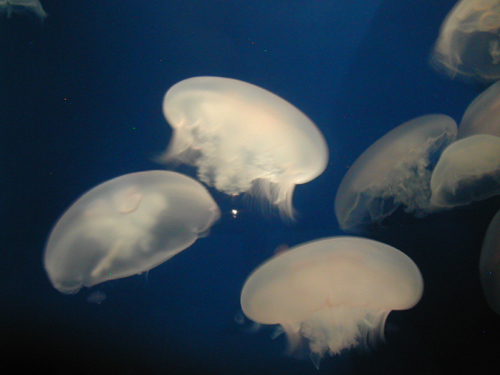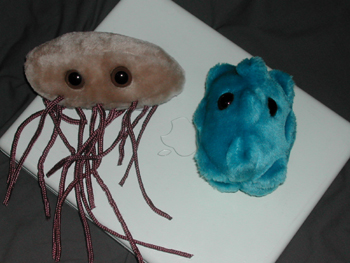Today I stumbled upon a story the elder Free-Ride offspring wrote. Possibly intended to strike a Charles Dickens-like tone, I think it ended up a bit closer to Dostoevsky.
Of course, I have to share it:

When Mice Go Caroling
Today I stumbled upon a story the elder Free-Ride offspring wrote. Possibly intended to strike a Charles Dickens-like tone, I think it ended up a bit closer to Dostoevsky.
Of course, I have to share it:

When Mice Go Caroling

There are lots of cool things to see at the Monterey Bay Aquarium, but my favorite by a fathom is the assortment of jellyfish. And somehow, among all the jellies they have, it’s the moon jelly that sticks in my mind as the canonical jelly.
As it turns out, probably it shouldn’t. According to the Monterey Bay Aquarium Online Field Guide, the moon jelly (Aurelia labiata) is somewhat unusual in having a fringe of cilia around its bell to sweep in the food. (Other jellies get the job done with dangling tentacles.)

*For Hanukkah this year, the elder Free-Ride offspring got E. coli and the younger Free-Ride offspring got Rhinovirus — not the actual microbes, but the Giant Microbes stuffed versions. These gifts actually exploited a convenient loophole in Casa Free-Ride’s moratorium on new stuffed animals, seeing as how bacteria are not part of the Animal Kingdom, and viruses aren’t even technically alive.
The eyes on these plush microbes did offend the sensibilities of the Free-Ride parental units, but we survived years of toy snails with eyes not properly located on eye-stalks. The real outrage was the identical claim on the swing tags of both the E. coli and the Rhinovirus that the stuffed microbes were 1,000,000 times actual size.
“Preposterous!” declared Dr. Free-Ride’s better half. “There’s no way that virus is anywhere close to the size of E. coli!”
In light of the ongoing flap about Iowa State University’s decision to deny tenure to Guillermo Gonzalez, I thought it might be worth looking at an actual university policy on tenure — the policy in place at my university — and considering the sorts of judgments required by policies like this. The take-home message is that tenure can’t be taken as a “sure thing” if only you produce a certain number of publications.
I was reading John Timmer’s post on Ars Technica about the call for a presidential debate on science and technology and found myself surprised at how many of the commenters on the post think such a debate would be a terrible idea.
It’s not just that the commenters think that the presidential candidates would use all their powers to weasel out of taking clear stands that might get them in trouble with one constituency or another. There are quite a few commenters who make variations of this argument:
I don’t see this as being a very good idea. These people are POLITICIANS, not scientists. I do not want to see them debating issues they have little worthwhile knowledge. If elected, they should rely on their advisors, and more importantly, the SCIENTISTS themselves to determine scientific policy. Science should not be “up for political debate.” Science should follow the scientific method. Having some sort of half-baked, pre-programmed, campaigning answers only politicizes science even more — which is exactly what we should try to avoid.
The list of questions I have for presidential hopefuls is manifestly not an oral exam on anything the candidates might have learned in their science classes. (Not a single question on intermolecular forces, I swear!) But just to be clear:
In response to one of my science-related questions for the presidential candidates, Drugmonkey points out that the question might not work the way I want it to because of the chasm between science and politics:
“8. If sound scientific research were to demonstrate that one of your policy initiatives couldn’t work (or couldn’t work without tremendous cost in terms of money, health risk, negative environmental impact, etc.), what would you do?”
This almost, but not quite, hits the fundamental cultural problem between the two societies, science and politics. Your question should be reframed as “what if research were to demonstrate your policy hadn’t worked in the first three years, then what would you do?”. The problem is that political behavior is unfalsifiable. “My policy didn’t work? Well, we just didn’t do it enough. Let’s do it more.” Tax cuts or welfare, same deal. No testing, falsifying and moving on to something else because the data told us the policy was flawed. Even the slightest sign of this and someone is a “flip flopper”.
I think Drugmonkey’s diagnosis of the politician’s MO is probably right. And, it occurs to me that this is the thing I hate most about politics-as usual. It’s what makes me want to hold the candidates down and ask them for their stand on reality.
David Ng at The World’s Fair asks what kind of scientist Santa Claus might be. I’m not sure I have the answer to that, but I at least have a hunch about what kind of scientist might make the most headway studying Santa. (Of course, if Santa followed Socrates’ advice to “Know thyself,” that would be the kind of scientist Santa should be.)
Do furnaces break more frequently in the winter than the summer, or do people just have occasion to notice non-functional furnaces when the weather gets really cold?
(Why yes, our furnace has broken, and our temperatures have been dipping below freezing. Why do you ask? Is it my pathetic chattering?)

Science matters. It’s hard to make good decisions in today’s world that aren’t somehow informed by sound science — especially if you’re the head of state of a country like the USA.
This means that it’s important to know where the people lined up to get the job of President of the United States stand on science. Those of us deciding how to vote could use this information, and even you folks who are subject to US foreign policy have a significant interest in knowing what you’ll be in for.
There ought to be a presidential debate focused on science and technology before the 2008 election. It’s not just the bloggers who think so, either. A bunch of serious scientists support the idea, too.
Here are some big things I want to know about where presidential candidates stand on science — the kinds of questions a science and technology debate might put on the table:

On a recent trip to the Monterey Bay Aquarium I snapped this picture of an underwater garden of the sort you might find in mangrove forests and shallow lagoons along tropical coasts.